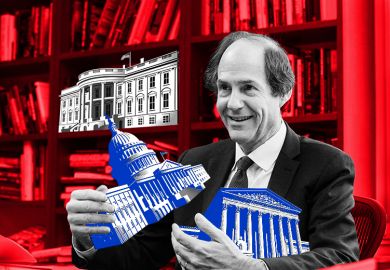A few years ago, Martin Parker, now professor of organisation studies at the University of Bristol, wrote a critical account of managerialism in a particular UK university that was accepted for publication in a Taylor & Francis journal. But someone objected, the publisher consulted libel lawyers and the paper was spiked. It eventually appeared in the SAGE journal Organization in 2014, but only after the publisher acquiesced to the university’s demand to be anonymised.
A new Defamation Act took effect in England that year. London had become the centre of international excellence in libel litigation by the rich and the powerful. The government promised “a new era of libel law that protects freedom of expression and encourages open and honest public debate”. Academics publishing material in the public interest were identified as particular beneficiaries.
But those drafting the act failed to appreciate the forces that have contorted academic publishing. Open and honest debate has not fared well. These days, academics publish not so much in the public interest as in their own. Papers have become academe’s key performance indicator, determining appointments, promotions and funding. As the bankers of this currency, academic publishers print their own money. Aggressive expansion and acquisition have left the industry dominated by five profit-hungry companies whose business model is to protect the goose that lays the golden eggs at all costs.
Such companies have no truck with “publish and be damned”. Many explicitly state that their editors – treated as little more than cheap, disposable labour – must do everything they can to reduce the risk of libel claims, on pain of dismissal. Authors, too, are often threatened with total liability for any defamation claims, while even book reviewers have been left to face the music alone.
As Times Higher Education recently reported, my own journal, Prometheus: Critical Studies in Innovation, was dropped by Taylor & Francis (allegedly for commercial reasons) when we sought to publish an edition of debate papers questioning the medical orthodoxy on shaken baby syndrome. The publisher saw nothing untoward in requesting all correspondence between editors and authors. It wanted to know who had reviewed each paper and to see their confidential reports. After many months and many lawyers, all 11 papers were deemed likely to be libellous because they were critical of prominent individuals and institutions. Nothing could be said unless the publisher – not the editor or the author – was “able to completely verify the facts”.
Prometheus had form. In 2011, Taylor & Francis brought in libel lawyers to vet our debate on whether English libel laws stifled academic discussion. This delayed production for months and rather proved the point that many authors were making. Then, in 2014 – as THE also reported – our editorial board threatened to resign en masse when the company made significant cuts from a paper criticising publishers’ profit margins (although the company eventually apologised for being “overzealous”).
A survey in 2010 by the journal Science of 22 scientific journals found no case of editors removing material on legal grounds that they would not have removed for academic reasons. But the new Defamation Act has made matters worse by – to paraphrase University of Melbourne law professor Eric Descheemaeker – paying lip service to free speech at the cost of yet more complexity and uncertainty. Who but the publisher’s libel lawyers are to determine whether an author meets the new, untested defence of “honest opinion”, for instance?
Where there is doubt, lawyers understandably urge caution. And criticism must always entail some libel risk, however tiny. In the shaken baby debate, the president of the General Medical Council was reckoned likely to have libelled the General Medical Council and a senior policeman to have libelled the police – both, it would seem, by simply mentioning these organisations.
Legal theory may be concerned with a delicate balance between freedom of expression and the ability to protect a reputation, but any risk is a risk too far for academic publishers.
Even in 2010, the Science survey discovered a “chilling effect” from the threat of libel, causing authors to self-censor. Now something yet more chilling stands in the way of meaningful scholarship: profit-driven academic publishers letting lawyers determine their academic responsibilities.
Stuart Macdonald is editor of Prometheus and a visiting professor at the University of Leicester.
Register to continue
Why register?
- Registration is free and only takes a moment
- Once registered, you can read 3 articles a month
- Sign up for our newsletter
Subscribe
Or subscribe for unlimited access to:
- Unlimited access to news, views, insights & reviews
- Digital editions
- Digital access to THE’s university and college rankings analysis
Already registered or a current subscriber?









